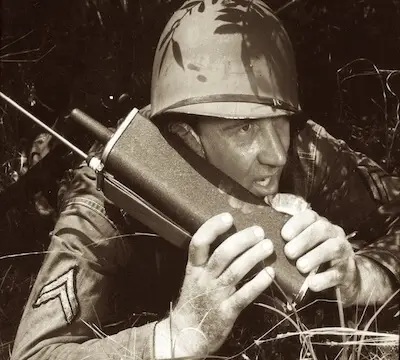A walkie-talkie is a portable radio transmitter and receiver used for two-way communication.
The name was also used in the mid-20th century as the name for a type of animated doll and also as a type of dance.
A walkie-talkie is a portable radio transmitter and receiver used for two-way communication.
The name was also used in the mid-20th century as the name for a type of animated doll and also as a type of dance.
The first time the reduplicated phrase was used wasn’t as the name of a radio.
The ‘Walkie-talkie’ was a short-lived dance craze in the USA in the early 1930s. It appeared to be a quite elaborate dance involving dancing while pretending to stroll and hold a conversation. It was reported in several US newspapers in January 1931, including The Lancaster New Era:
The walkie-talkie is the latest dance step devised by a group of capital débutantes. Its basis is the fox trot… It was evolved as a fitting accompaniment to the new long, demure-looking gowns… To do it a girl must do triple duty – a dancer, a listener and a small-talker.
The first mention of ‘walkie-talkie’ as a radio set comes a few years later, as in this early reference in the Brooklyn Daily Eagle, August 1938:
During the drills a new radio telephone set, a “Walkie-Talkie” was utilised for the first time under field conditions.
The radio sets were definitely invented and named after the dance craze of 1931. Whether the name for the sets came to mind because of the dance isn’t clear. It could be that the two were named independently. Although the independent coinage doesn’t seen likely, it is possible – US infantrymen and Washington débutantes moved in different circles.
Walkie-Talkie dolls, which emerged around 1943, also might or might not have been named independently of the radio sets and the dance. The dance had gone out of style by then but walkie-talkie radios had been used very widely in WWII, so it may well be that the dolls took their name from them. Or, it may be that the dolls, as they were intended to walk and talk, might have been named Walkie-Talkies anyway. Again, doll manufacturers and the military wouldn’t have been in close contact.
There was also a type of doll called a ‘Talkie-Walkie’ and they pre-dated the radio sets, as is seen in this advert from the California newspaper the Hanford Morning Journal, December 1930.
Those dolls couldn’t have been named after the radio sets, so maybe the Walkie-Talkie dolls weren’t either.
So, we have three contexts where walking and talking at the same time were done – dancing, radio communications and animated dolls. The order that they were referred to in print (as far as we currently know) is dance, radio set, doll.
It’s not impossible that their names were coined independently but, as the phrase ‘walkie-talkie’ hadn’t been used before 1931 and was used widely afterwards, it seems unlikely.
I think you are on safe ground to claim that a ‘walkie-talkie’ was first a dance, then a radio set, then a doll.
Trend of walkie – talkie in printed material over time

A B C D E F G H I J K L M N O P Q R S T UV W XYZ
American Animals Australian Bible Body Colour Conflict Death Devil Dogs Emotions Euphemism Family Fashion Food French Horses ‘Jack’ Luck Money Military Music Names Nature Nautical Numbers Politics Religion Shakespeare Stupidity Entertainment Weather Women Work
Have you spotted something that needs updated on this page? We review all feedback we receive to ensure that we provide the most accurate and up to date information on phrases.